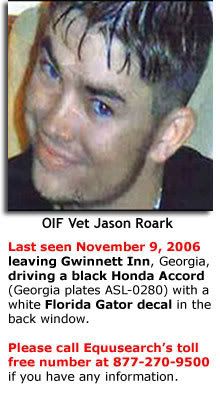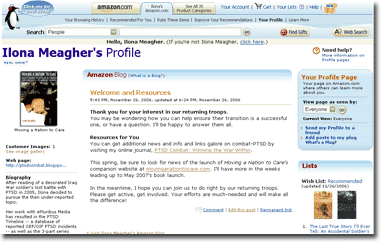Frederick News-Post Covers Combat PTSD
 Alison Walker-Baird of Maryland's Frederick News-Post offers two well-written articles on combat PTSD today. The paper's Karen Gardner files another, too. Well done, News-Post!
Alison Walker-Baird of Maryland's Frederick News-Post offers two well-written articles on combat PTSD today. The paper's Karen Gardner files another, too. Well done, News-Post!
From Walker-Baird's Stress Wounds:
The face of Post Traumatic Stress Disorder is changing. Far from the misguided stereotype of a wheelchair-bound, unemployed, middle-aged man, today's veteran with PTSD looks more like Spc. Christopher Clayton of Hagerstown, like your next-door neighbor. The 29-year-old Maryland Army National Guardsman returned from Iraq in May after 18 months in combat, greeted with hugs and beaming smiles from wife, Erika, and two young daughters.
He works full time and is pursuing a career in nursing. But a year and a half of constantly being on edge left this loving husband and father with depression and mood swings, and a diagnosis of PTSD. He's getting help. More than 400,000 veterans from the wars in Iraq and Afghanistan are expected to do the same.
Solid information, including stats and personal accounts, in all three pieces. Click on 'Article Link' below tags for more...
Continuing from Stress Wounds:
People with PTSD often don't experience symptoms until months or years after the traumatic experience. Despite the predicted flood of veterans needing mental health services, significantly fewer troops have served in Iraq and Afghanistan than in past conflicts such as the Vietnam war.
The U.S. Census Bureau estimates 8.2 million veterans served in Vietnam, making up more than 30 percent of all U.S. veterans, and about 3 million served in the Persian Gulf War. Studies have estimated from 19 percent to 31 percent of Vietnam veterans developed PTSD at some point, with between 9 percent and 15 percent still having the disorder by the end of the 1980s.
Among Gulf War veterans, 1997 and 2003 studies found 2 percent to 10 percent were still suffering from PTSD a decade after returning from deployment.
Plenty of stats on the relationship between injuries and the heightening of PTSD risk:
For every service member who dies in Iraq, nine have been wounded but survived. While more troops in Iraq and Afghanistan are surviving injuries that would have killed them in past wars, they are at risk of developing PTSD. Being wounded in a traumatic experience puts one at a significantly greater risk of developing PTSD than someone who was not injured, several recent studies found.
In the Vietnam and Persian Gulf wars, 24 percent of the wounded died. About 1 in 10 troops injured in Iraq has died, the lowest rate of any U.S. war.
They have survived with the help of better equipment and medical care than in past wars, but the weapons used in Iraq today leave many with lifetime disabilities or disfigurement. Pentagon data show more than half of troops injured are hurt so badly they can't return to war.
Military surgeons reported a high incidence of blindness, multiple amputations, burns and significant brain damage, according to Dr. Atul Gawande's study on modern war casualties published in the New England Journal of Medicine in December 2004.
Roadside bombs have caused about half of U.S. troops' injuries and deaths in Iraq, the Department of Defense's Defense Manpower Data Center reported.
Walker-Baird's second piece, Soldier faces new battle with PTSD, is an inside look into one solider's journey home from combat:
He spent 18 months in Iraq, constantly wound up and never letting his guard down. When the veteran returned home to his family, the stress didn't disappear as easily as changing into civilian clothes.
For this Hagerstown man, the wake-up call was his 3-year-old daughter telling her dad he was too angry. Spc. Christopher Clayton was living with Post Traumatic Stress Disorder.
Spc. Clayton, a member of the Frederick-based Alpha Company in the 1-115th Infantry Regiment of the Maryland Army National Guard, didn't experience symptoms of the disorder until several months after he came home.
Gardner contributes another personal account in The strength to find help: A Vietnam veteran takes steps toward healing:
Curtis Callender served in Vietnam. He went on to serve in the Army for an additional 25 years, retiring 15 years ago. It wasn't until less than a year ago, however, that he was diagnosed with Post Traumatic Stress Disorder.
Mr. Callender, 62, a native of Texas, works for the Military Amputee Research Program at Fort Detrick. After Vietnam, he became a medic in the Army and retired as a sergeant major. But something wasn't right. "I cried if I saw anything war related," he said. "I thought it was a weakness in my personality."
War movies, war stories, just about any reminder of war set him off. And as he got older, the tears came more often. He had been to see George Kauffman, the Veterans Service Officer for the Maryland Department of Veterans Affairs, at his Frederick office. "George is the one who thought I should get checked," he said.
Please read the rest, and then consider thanking the Frederick News-Post for this important coverage. Way to go!


 From the
From the  We have another missing veteran -- from Georgia.
We have another missing veteran -- from Georgia.
 As most of us head off to be with (or are already with) our loved ones today to share turkey and pie and all the warmth of their company, we take note of how blessed we are to have those moments.
As most of us head off to be with (or are already with) our loved ones today to share turkey and pie and all the warmth of their company, we take note of how blessed we are to have those moments. 













